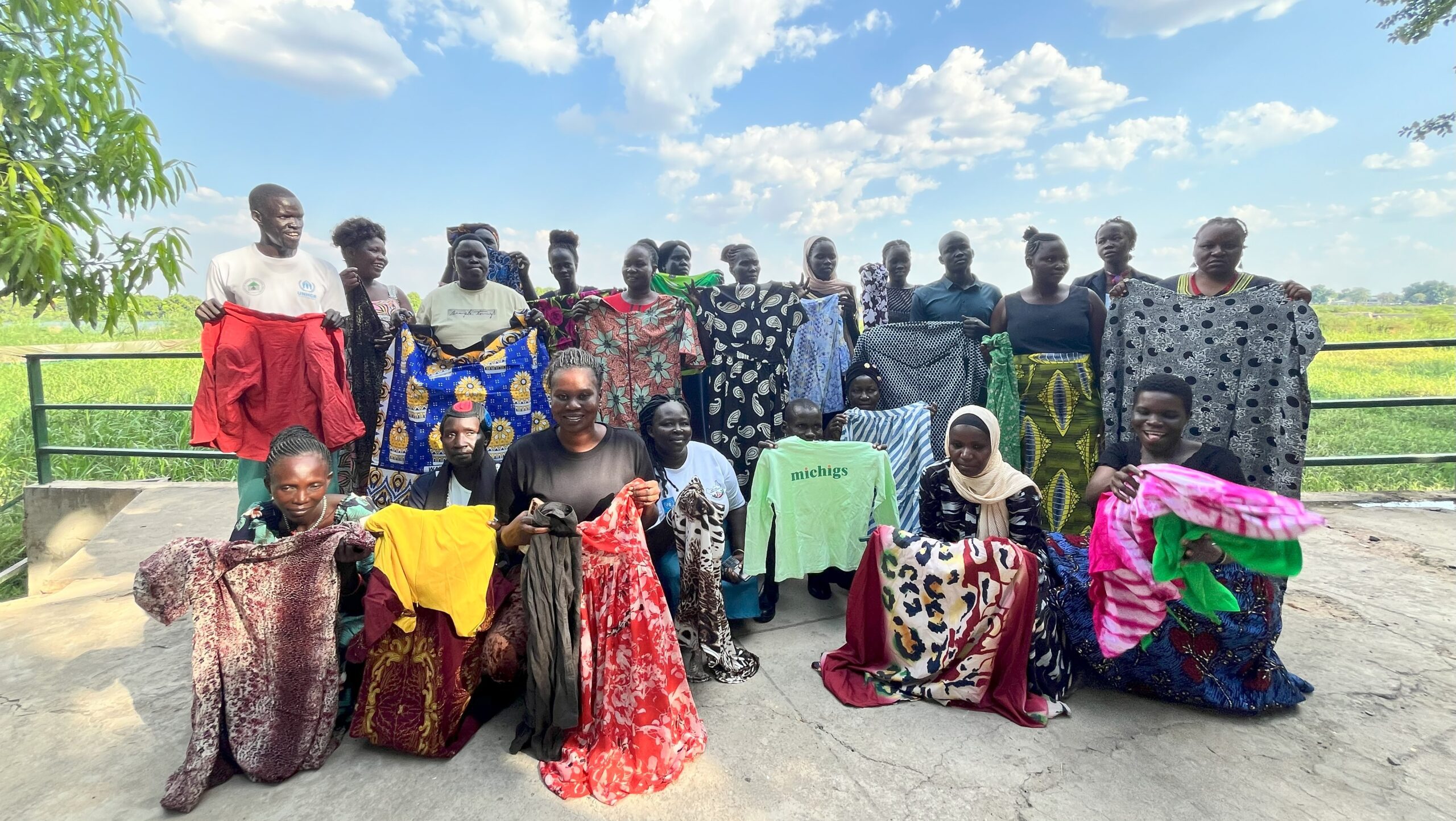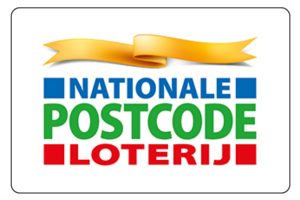June 28, 2024
Thinking of You (2024): A tribute to survivors of conflict-related sexual violence in The Hague

Survivors’ dresses hung among the trees of the Lange Voorhout in The Hague. Photo by Andreas Terlaak.
Thinking of You
From June 3-28, visitors walked under the colourful dresses hung up in the Atrium of the City Hall and along the Lange Voorhout in The Hague. This was Thinking of You (The Hague, 2024), an art exhibition dedicated to survivors of conflict-related sexual violence (CRSV). Here, we will recap the highlights of the exhibition.
Solidarity and accountability
The success of Thinking of You (The Hague, 2024) was made possible through the important roles played by SEMA and the Red Line Initiative. Many of the dresses in the exhibition were donated by members of SEMA, the Global Network of Victims and Survivors of Wartime Sexual Violence, as an act of solidarity with survivors worldwide.
Additionally, the art exhibition was supported by the Red Line Initiative, which belongs to the Mukwege Foundation’s Justice and Accountability pillar and calls upon States to hold perpetrators accountable for these crimes. Together with SEMA survivors, we want to draw a Red Line to end CRSV.

Jacqueline Mutere, a SEMA member from Kenya. Photo by Tag House.
Drawing a Red Line to end conflict-related sexual violence
Several noteworthy moments marked the journey of Thinking of You (The Hague, 2024). It began on June 3rd with the opening of the indoor exhibition. Over 400 dresses were hung from clotheslines throughout the Atrium of the City Hall of The Hague. The Atrium, located in the heart of the International City of Peace and Justice, provided the perfect canvas for this exhibition; it was a visually pleasing backdrop for the dresses, while attracting hundreds of daily visitors.

Indoor exhibition of Thinking of You (The Hague, 2024) in the Atrium of the City Hall in The Hague. Photo by Andreas Terlaak.
Two weeks later, on June 18th, the outdoor exhibition was unveiled, featuring an additional 800 dresses from survivors in over 20 countries. These dresses were donated by SEMA members from Guinea, Mali, the Central African Republic, Iraq, Nigeria, Ukraine, the Democratic Republic of Congo, Colombia, Guatemala, South Sudan, Syria, Libya, Rwanda, Uganda, Côte D’Ivoire, Kenya, the Gambia, Kosovo and Bosnia and Herzegovina, as well as survivors from Myanmar and Ethiopia.
“[We want to show] the international community that we also, in the Central African Republic, have been through the atrocities together with other survivors. So, we would like to share this day, this activity, this moment together with others.” – Miryam Djangala-Fall, coordinator of MOSUCA, a survivor network in CAR
The artist, Alketa Xhafa Mripa, emphasised the significance of hanging the dresses in public spaces like the Lange Voorhout, asserting that for art to truly combat injustices, it must be accessible to everyone, not just those who visit museums.

Outdoor exhibition of Thinking of You (The Hague, 2024) on the Lange Voorhout. Photo by Andreas Terlaak.
June 19th, the International Day for the Elimination of Sexual Violence in Conflict, was another important day. We hosted the official reception for Thinking of You (The Hague, 2024), featuring speeches from distinguished guests, such as Dr Denis Mukwege and the Deputy Mayor of The Hague, Mariëlle Vavier.
The event also included powerful and emotional speeches from survivors themselves. Two members of SEMA, Jacqueline Mutere and survivor activist and Presidential Special Envoy of Kosovo, Vasfije Krasniqi-Goodman, shared their personal experiences with CRSV and explained what this art exhibition meant to them.
They emphasised that this artwork serves as a reminder of the reality of CRSV, that we must talk about it, and take action to end it. Jacqueline and Vasfije’s stories added a new dimension to the artwork, reminding us that behind every single dress is a story of grave injustice but also immense courage.

SEMA members, artist Alketa Xhafa Mripa, and Kosovo Ambassador H.E. Mr. Dren Doli at the Thinking of You (The Hague, 2024) official reception. Photo by Floor Beemster.
A global conversation
Thinking of Ÿou (The Hague, 2024) received significant acclaim in the press, both nationally and internationally. Dutch newspapers such as NRC, AD, and Telegraaf recognised the need to bring the topic of CRSV into public discussion. Additionally, the exhibition caught the attention of global newspapers like The Guardian, which selected a photograph of the outside exhibition as their Photo of the Day. This press coverage helps us get closer to our goal of breaking the silence surrounding CRSV.

Photo of the outdoor art exhibition selected as The Guardian’s ‘Photo of the Day’. Photo by Robin Utrecht.
Airing out the dirty laundry
Throughout the exhibition, June 3-28, Mukwege Foundation staff and volunteer guides were present to engage with visitors, answering questions and providing insights into the stories behind the dresses.
As the Thinking of You guides reported, it was eye-opening to witness the range of reactions—some visitors were newly introduced to the issue of CRSV, while others shared that they have long been concerned about the issue. These interactions underscored the exhibition’s goal: to break the silence surrounding CRSV and to foster a dialogue.
Visitors often remarked on the stark juxtaposition of the installation, noting how their eyes were drawn to the beauty of the dresses, while being confronted by the profound and heart-breaking meanings behind them. This contrast sparked conversations, echoing the sentiment captured by De Telegraaf’s headline about “airing out the dirty laundry”.

Two visitors walking through the outdoor exhibition on the Lange Voorhout. Photo by Andreas Terlaak.
Behind the scenes: The origin of the dresses
“How did these dresses get here?” was one of the most common questions raised by visitors.
Most of the dresses were donated by SEMA, the Global Network of Victims and Survivors of Wartime Sexual Violence, as well as other national survivor networks we support at the Mukwege Foundation.
The Mukwege Foundation works to help survivors get access to quality holistic care as a standard and a right. This approach is inspired by the model and philosophy of care of Panzi Hospital and Panzi Foundation (Panzi) in the Democratic Republic of Congo.
To date, the Mukwege Foundation has supported knowledge exchange, training of trainers and other capacity-building activities in countries including Central African Republic, Democratic Republic of Congo, Ethiopia, Guinea-Conakry, Iraq, Rwanda, Uganda, Ukraine, Zambia, Colombia, among others.
When the Mukwege Foundation asked SEMA survivors to donate a dress, many survivors expressed the importance of having their voices heard on a global stage. Judith, a member of the Survivors Network of South Sudan (SUNS) explained that “the reason why we gave the clothes is because we are standing in solidarity with survivors across the globe, not only in South Sudan”. This encapsulates the essence of Thinking of You (The Hague, 2024)–to represent survivors worldwide and draw a red line to end CRSV.

The Mukwege Foundation programme team and SUNS network in South Sudan.

SUNS, a survivor-led national network in South Sudan, donates dresses in support of survivors. Photo by SUNS
Thank you
As we wrap up the wonderful process that was Thinking of You (The Hague, 2024), we want to extend our gratitude to those who helped make this exhibition possible. First, we thank our collaborators, artist Alketa Xhafa Mripa, the Kosovo Embassy in the Netherlands, and the Municipality of The Hague.
Alketa, in addition to being the visionary and creator of the installation, contributed hundreds of dresses donated by survivors of CRSV in her native Kosovo. The Kosovo Embassy played a vital role in handling the dresses and showed a deep sense of commitment to amplifying the voices of survivors around the globe. Our partnership with the Municipality of The Hague was also crucial to realising Thinking of You (The Hague, 2024). Their support in setting up the exhibition in their City Hall and streets helped was instrumental to bringing public attention to the pressing issue of CRSV.
Our most profound thanks go to the survivors of CRSV who donated their dresses. Even though most could not see the installation in person, we have strived to stay connected by sharing photos and keeping a guestbook filled with messages of appreciation from visitors.
Special thanks to our sponsors, the Nationale Postcode Loterij, the largest charity lottery in the Netherlands, VFonds, the National Fund for Peace, Freedom and Veterans, and the Embassy of Canada to the Netherlands. Their support was key to bringing this powerful installation to life.

Survivors’ dresses hanging in the Atrium City Hall (The Hague). Photo by Andreas Terlaak.

Survivors’ dresses hanging from red whasing lines inside the Atrium City Hall (The Hague). Photo by Andreas Terlaak.

Alketa Xhafa Mripa in front of art Thinking of You (The Hague 2024) in park Lange Voorhout. Photo by Andreas Terlaak.

Katrien Coppens, director of the Mukwege Foundation, and Dr. Denis Mukwege, Nobel Peace Laureate 2018 visiting Thinking of You (The Hague 2024). Photo by Elena Chavez Goycochea

Survivors’ dresses hanging from red washing lines in park Lange Voorhout. Photo by Andreas Terlaak.

Collaborators, organisers, and the artist celebrating June 19th during the official reception of Thinking of You. Photo by Floor Beemster.
















